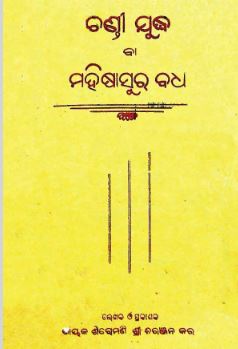Niranjan Kar’s enchanting work “Chandi Juddha ba Mahisasura Badha” published in 1963, beckons readers into the mystical realm of Odia Kavya, weaving together elements of mythology, valor, and divine intervention. In this epic narrative, Kar breathes life into ancient tales, particularly focusing on the legendary battle between the fierce goddess Chandi and the formidable demon Mahisasura.
“Chandi Juddha ba Mahisasura Badha” immerses readers in the cosmic drama of good versus evil, portraying the relentless battle between the forces of light and darkness. Through vivid imagery and lyrical verses, Kar brings forth the courage, strength, and divine grace of Goddess Chandi as she combats the malevolent Mahisasura, symbolizing the triumph of righteousness over tyranny.
The narrative unfolds with intensity and fervor, capturing the essence of Odia Kavya as a literary form that blends mythological lore with poetic expression. Kar’s mastery of language and storytelling transports readers to a realm where gods and demons clash, where sacrifices are made, and where the ultimate victory lies in the hands of the virtuous.
Mahisasura, the demon king with his formidable powers and egoistic pride, emerges as a formidable antagonist in the narrative, challenging the very fabric of divine order. Through intricate descriptions and profound character portrayals, Kar delves into the depths of Mahisasura’s psyche, unraveling the motivations behind his defiance and the consequences of his actions.
Central to the narrative is the figure of Goddess Chandi, the embodiment of Shakti or divine feminine energy, symbolizing strength, protection, and transformation. Kar’s portrayal of Chandi as a fierce warrior goddess, wielding her weapons with grace and resolve, showcases the power of feminine energy in overcoming adversity and restoring cosmic balance.
As the battle between Chandi and Mahisasura unfolds, Kar explores themes of courage, devotion, and the eternal struggle between good and evil. Through intricate poetic narratives and allegorical symbols, he invites readers to contemplate the deeper meanings embedded within the mythological tapestry, urging them to reflect on the eternal quest for justice, righteousness, and spiritual evolution.
In conclusion, “Chandi Juddha ba Mahisasura Badha” by Niranjan Kar stands as a timeless masterpiece that resonates with the rich cultural heritage of Odisha and the enduring significance of mythological narratives. Through Kar’s lyrical verses and evocative storytelling, readers are transported to a world where gods and demons clash, where divine intervention shapes destiny, and where the triumph of light over darkness reaffirms the eternal truths of the human experience.
Books Info
| Books name | Chandi Juddha ba Mahisasura Badha |
| Author | Madhyamik Siksha Board |
| No Of pages | 307 |
| Publisher | Sri Niranjana Kara |
| Publication | 1973 |
| Printed At | Durga Press |
| Distributor | NA |

